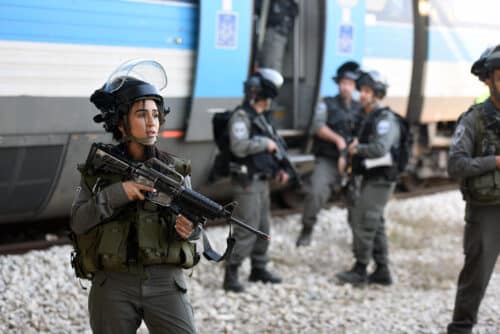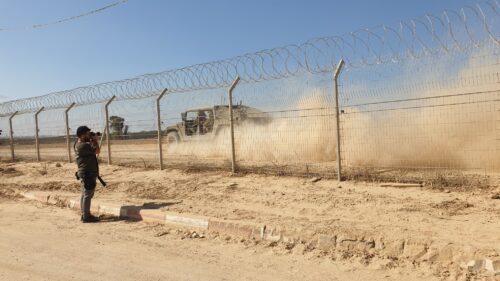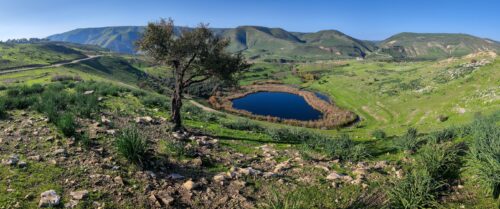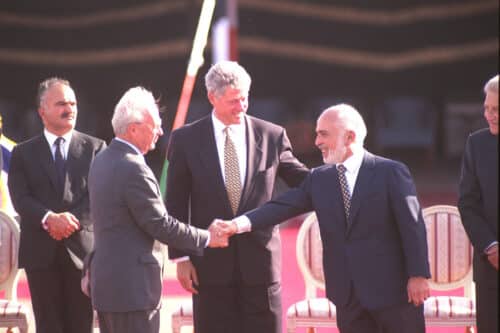Developments and events in recent months in the PA territories and the Gaza Strip, raise crucial questions regarding the prospect of the future survival of the PA. Talks with senior PA and Fatah officials, and with other Palestinian sources within Judea and Samaria (“West Bank”) with knowledge of the matter, paint a clear image of the Fatah-based Authority that is gradually losing its grip over its jurisdiction.
Indeed, the PA’s medical chart is a mile long with endless ailments – and the so called “lack of diplomatic horizon” is far from the worst among them. Senior Palestinian officials highly doubt the efficacy of the PA, its status and its mere survivability. This lack of trust stems from various causes, chief among them recent developments and trends on the Palestinian street, the rise of Hamas, the loss of the PA institutions’ credibility with the Palestinian public, and political infighting.
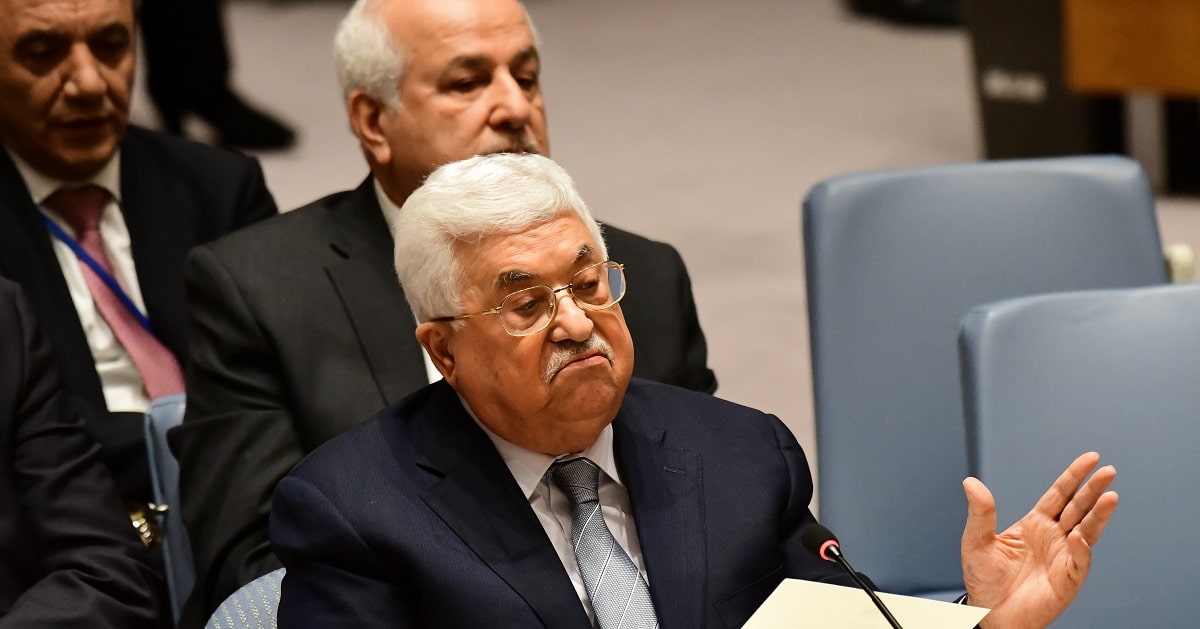
It is therefore clear that the PA is not a stable entity, and it has in fact been in decline for years. In light of this understanding Israel stands before two undisputable principles:
- Israel continues to maintain the PA economically, but is unable to act towards reinforcing it politically, simply because the PA has long lost its credibility on the Palestinian street and its influence over the Palestinian people;
- Moreover, Israel must neither buttress nor legitimize the PA, as any diplomatic asset deposited in the hands of the current Palestinian leadership is sure to fall into unintended hands, be it today, tomorrow or at any point in the future. In the same manner that diplomatic and strategic assets were to be withheld from the disintegrating Afghan government, that was plucked like a ripe fruit by the Taliban in the wake of the US’s withdrawal; or from the Syrian regime, which fragmented into cells of control, similarly to the current state of affairs in Judea and Samaria, it is imperative that any assets – be they financial, professional, international legitimization, weapons and military buildup – be withheld from the PA, which is already fragmenting into factions and areas of control. Any such assets will instantly and effortlessly be seized by either the Hamas, extreme factions or any player in the arena who might have fundamentalist intentions, which could overthrow the Palestinian Authority at any given time.
Granted, despite the clear signs of disintegration, the PA still survives, for a number of reasons, first and foremost thanks to its being the manifestation of the Palestinian’s greatest achievement to boot: the establishment of control over the lions’ share of the Palestinian people living within the 67’ territories; the commitment by the international system and the Arab world to preserve the PA and view it as a state in the making; and finally, Israel’s commitment to maintain the status quo and cement the PA’s standing. Israel has chosen for many years to skirt any measures and steps that would impart to the PA that its policies are unacceptable and that its support of terrorism would come with a steep price tag. The Israeli government failed to exact a toll on the PA’s unilateral actions and violations of agreements. At times, Israel even avoided enforcing the “Offset Law” (the 2018 Law on Freezing Terror Funds) and granted loans to support the Authority – at the behest of senior officials in the Israeli security establishment.
Precisely for that reason, it appears that the telltale signs of disintegration are pushing the Authority to a more extreme position, such as its entrenched position towards salaries for terrorists, the encouragement of anti-Israel incitement, the excessive expansion of illegal construction in C areas under the Fayad Plan, and additional extreme steps on the international level such as appealing to the International Court of Justice (ICJ) in The Hague, driving actions in the UN, such as assembling the Security Council to adopt resolutions against Israel.
The shift in the current government’s policy on this matter manifests not as an objective of dismantling the PA framework itself, but rather to bring about a change of its policy by adopting measures that aim to impress upon the Authority that Israel’ support is not to be taken for granted. Among the means designed toward this end are the implementation of the “Offset Law”, forfeiture of part of the money deducted from the PA for the purpose of implementing legal rulings regarding compensations to terrorism victim families; increased enforcement of construction restrictions in C Area, and the revocation of entrance permits to Israel from PA senior officials involved in the appeal to the International Court of Justice (ICJ) and those who have visited the released terrorist Karim Younis to welcome him on his return home.
This paper reviews the causes for the disintegration of the Palestinian Authority, in three sections:
- Civil and social protest on the Palestinian streets;
- The withdrawal of Fatah in the face of a rapidly rising Hamas;
- The erosion of the PA’s scope of control in its territories. .
Introduction: The Telltale Signs of the PA’s Decline
The current sentiment on the Palestinian street is testament to how weak the Mahmoud Abbas (Abu Mazen) government and the Fatah’s hold in fact is. The person who “lost” Gaza, dismantled the Fatah, called off the elections, bled dry the very legitimacy of his own existence, paralyzed the civil institutions, allowed political corruption to soar to record highs, imposed sanctions on the Gaza Strip, lost control over the Judea and Samaria peripheries; the man under whose rule the Palestinian problem was relegated to the bottom of the international community’s agenda – is responsible for turning the PA – either by design or out of his own weakness – into a relic of the past.
In a military conference last September, IDF Chief of General Staff, Lieutenant General Aviv Kochavi said : “part of the increase in terrorism stems from the incompetence of the Palestinian security mechanism, leading to loss of governance in sections of Judea and Samaria – areas which serve as fertile grounds for the rise of terrorism hotbeds.”
Still, it is unclear from Lieutenant General Kochavi’s remarks whether it is a lack of efficacy on part of the Authority – leading, for example, to the resounding failure of the “governance operation” announced by Abu Mazen in late 2021, ultimately causing the dismissal of the entire top command of his security mechanism– or lack of motivation, despite the existential threat to the “Palestinian dream”. Developments in recent days – such as Palestinian efforts to thwart armed groups in Nablus even at the cost of acquiring arms for the security forces, indicate that the most likely problem is incompetence rather than lack of desire to regain control of the area.
One way or another, these recent events raise the following question: in the twilight of Abu Mazen’s chairmanship over the PA, will the Authority cease to exist as we know it? This question emerges for numerous reasons, among them pressure from within his own government to withdraw from agreements with Israel, the splintering of Fatah into rival factions, the rise of Hamas’ power, and the trust crises on the Palestinian street?
The day after Abu Mazen
Recent developments in the PA areas are but a prologue to the post Abu Mazen era. The current 87-year-old PA chairman is “included in a long list of health risk-groups” – says a source in Ramallah.
Many in the PA and Fatah alike are convinced that we are witnessing the demise of the “Ra’is” Mahmoud Abbas. Further signs of the shape of things to come are:
- Civil-social unrest
- The government institutions are degenerated and plagued with rampant corruption – there is no parliament, government budgets are emaciated and corruption reigns throughout the Authority.
- The Palestinian people express their distaste towards the manner in which Abu Mazen and the Authority are running things, and is calling on them to step down. In a survey conducted in December 2022 – 80% of the Palestinian public thought that the PA is a corrupt body, and 77% demand that Abu Mazen step down. Additionally, it was found that were elections to be held now – Abu Mazen would gain the support of only 33% of the Palestinian public while his opponent – Hamas leader Ismail Haniyeh – would enjoy the support of 55% of that public.[1]
- A declining Fatah against a rising Hamas
- The Fatah Movement has for all intents and purposes, split into three and a half large blocs, with the Central committee still under the control of Abu Mazen, Mohammed Dahlan’s Fatah offshoot was ousted from the movement, and other factions pledge their allegiance to Marwan Barghouti, who even though he is a member of the Central Committee, is perceived as an oppositional factor against Abu Mazen.
- Recent rifts in Fatah testify to the deep running animosity among the claimants to the crown: Hussein al-Sheikh and Majed Faraj – from Abu Mazen’s supporting camp, on one hand, and on the other – Jibril Rajoub, Tawfiq Tirawi, who faces possible removal from Abu Mazen’s inner circle, Mahmoud Aloul – currently Abu Mazen’s Fatah deputy is debating on his next steps, and others.
- Even within the Central Committee there’s growing resentment towards Hussein Al-Sheikh, who is endorsed by Abu Mazen and was promoted by him to key positions, and appointed by him secretary of the PLO’s executive committee.
- Within the PLO itself, pressure is mounting against Abu Mazen to unilaterally withdraw from the agreements he had signed with Israel, and rescind Palestinian recognition of Israel. According to sources, Abu Mazen on his part is feeling pressure to withdraw from the agreements and now, as a last resort, he has appealed to the UN to recognize the PA as a full member, despite pressure from the US and Israel against this move.
- Alongside the internal rifts in Fatah, the Hamas is gaining momentum on the Palestinian street. Thus, for example, during the events leading to Operation Guardian of the Walls, and following the cancellation of the elections, Hamas displayed its willingness to butt heads with Israel and flex its muscles, thereby gaining a twofold advantage: the bolstering of its status in the eyes of the Palestinian public as the protector of the holy sites and as the spearhead of the battle against Israel – both at the expense of a weakening PA and of the Israeli security forces, which had to deal with widespread uprising of Arab civilians in multiple arenas at the same time.
- The erosion of the reach of the PA’s security controls
- Entire swaths of Judea and Samaria are increasingly slipping away from under the PA’s scope of control. What germinated in Jenin (the “Battalions” phenomenon, militia groups that have split from the dominance and authority of the PA and do not adhere to its orders) has already spread its roots to Nablus, and some Palestinian security officials fear that this phenomenon has even reached Ramallah, pinpointing in particular the Hamas’ stronghold in the area – the Silwad township.
- The refugee camps, mainly those in Samaria and central neighborhoods of Nablus, have become areas over which the PA no longer holds jurisdiction.
- The PA failed to enforce law and order in the Jenin region, and is gradually being driven southward, leaving the IDF to operate within the northern cities and villages (e.g. “Operation Break The Wave” for the apprehending of terrorists).
- The Fatah’s al-Aqsa Martyrs’ Brigades are reentering the cycle of terrorism, in collaboration with sources in the Palestinian security mechanism, mostly low-ranking officers. However, several terrorists who perpetrated attacks against the IDF are sons of high-ranking officers in the Palestinian security forces.
- The Hebron region is displaying overt hostility towards the PA, and many local issues are resolved by the heads of the family-clans (Hamoula). In Hebron – as in many other areas – the Palestinian Authority is not viewed as a legitimate governing body and is openly challenged by heads of family-clans.
All the above causes are eroding the legitimacy of the Abu Mazen government, and alongside the fragmentation of the Fatah and the succession battles, there is a bottom-up trend of severing loyalties to the PA and the forging of alternative alliances be they to the neighborhood, refugee camp, or to the local armed groups, who have become bona fide terrorist groups.
Many raise questions regarding the security deterioration and the decline of the PA at this specific point in time, and try to pinpoint the cause for this. In an attempt to give a plausible explanation to this state of affairs, is should be mentioned that it is a consequence of the wave of terrorism that emanated from Jenin, a grave attack that forced the IDF to undertake a prolonged campaign – “Operation Break The Wave” – in light of the PA’s incapability to deal with the epicenters of terrorism in the city. The unrest that was sparked in the wake of the Gilboa Prison break (of six Palestinian prisoners), had grown to become a long list of terrorist attacks, under the auspices of the Palestinian Islamic Jihad (PIJ) and possibly under sponsorship of Iran. At the same time, the Hamas channeled its efforts into Judea and Samaria while maintaining a “calm” in the Gaza Strip. Testament to the organization’s force buildup was the apprehension over the past year of more than 50 Hamas operatives from its growing headcount in the Judea and Samaria terrorism network and the efforts by the Turkish branch of the Hamas to establish presence in East Jerusalem.
In light of all this, according to senior official sources within the PA, the most crucial accelerant of the destabilization in the Palestinian arena are the succession battles, and senior sources in Ramallah concur with this view to a great extent, further claiming that we are witnessing the twilight of the last days of the Abu Mazen era. These views also resonate the recent remarks of IDF Intelligence chief Maj. Gen. Aharon Haliva, in which he asserted that “in regard to the Palestinian arena, it is more advisable to look to a further future – to the day after Abu Mazen and the ensuing battles of succession.”
Chapter 1: Civil-Social Unrest
Negative Sentiments
Repeated surveys of the Palestinian public over recent years – including the recent survey from December 2022, attest clearly and unequivocally to the rapid decline in the PA’s status:[2]
- Some 80% of the respondents repeatedly claim the PA is a corrupt entity;
- Over 60% call on Abu Mazen to step down;
- Some 70% think that the PA has become a burden on the Palestinian people and is no longer perceived as a national achievement.
The surveys also indicate a power-balance “seesaw” between the Hamas and the Fatah, wherein many times the Hamas wins the upper hand, as does Ismail Haniyeh over Abu Mazen.
The polls indicate another, interesting, phenomena that is the cause of worry in the top echelon of Fatah: when examining the surveys on rates of support for Marwan Barghouti, Mahmoud Abbas and Ismail Haniyeh – the former gains a rate of support of more than 70%, leaving mere scraps for the head of the PA and for the Hamas leader, demonstrating the sentiments prevailing on the Palestinian street.
The recent survey held last June by the Palestinian Center for Policy and Survey Research found that the rate of satisfaction with the work of Abu Mazen is a an unprecedented low of 23%, as oppose to a large majority of 73% that had voiced its dissatisfaction from his government. The survey found that 77% of the residents of the PA territories demand the Chairman’s resignation, while only 18% preferred he remain in office.
Furthermore, 54% of the respondents said they do not believe that elections for the Parliament and presidency will be held anytime soon. Additionally, the survey shows that were the elections to be held now, Abu Mazen would have garnered a 33%support rate, as oppose to a 55% support rate for his rival, Hamas leader Ismail Haniyeh.
When asked who they would support in the event that Marwan Barghouti – a senior member of Fatah serving a lifetime sentence in Israel – joins the race, 61% said they would support Barghouti, as oppose to only 34% who said they would support Hamas leader Haniyeh. Marwan Barghouti is also a favorite to win if Abu Mazen opts out of the race – with a support rate of 39% in such a contingency, while Ismail Haniyeh follows with only 17%.
Surveys also reflect the despondency and desire to immigrate in Palestinian society. Similarly to previous polls, the current survey reflects that 24% of the respondents wish to leave PA areas, with a 30% rate in Gaza.
Equally important was the respondents’ views on the resolution of the Israeli-Palestinian conflict – 66% expressed their opposition to a two-state solution, while only 25% supported it.
The Avalanche of the PA Legitimacy
After losing the legitimacy of his chairmanship, and becoming the target for scathing criticism from within Fatah, other organizations and particularly on the Palestinian street, and having led his rivals to found a confrontational coalition to his cabinet – the PA received another blow to its public and political status, when PA security personnel beat to death the social activists from Hebron, Nizar Banat ,during his interrogation.
The wave of protests that broke out in the immediate aftermath – corroborated by sources within the Israeli security system – were in effect the “turning point” of the legitimization for the PA government, and a definitive event rendering Abu Mazen’s chairmanship obsolete.
On top of these events comes the endless list of corrupt behaviors that were uncovered in the PA – including but not limited to unjustifiable nominations, nepotism, allegations regarding positions obtained through sexual bribery of top PA officials, and in particular in the diplomatic corps, embezzlement, unlawful acquisition of land and real-estate – even by senior PA security personnel, alongside other revelations.
This corruption had become rampant to such an extent that the US and Britain were recently forced to demand that Abu Mazen installs in the PA a mechanism that is similar to the Israeli Department of Internal Police Investigations that would operate in complete transparency, with the overall aim of stemming the avalanche of the PA’s legitimacy.
The protest spread to the international diplomatic level; nearly one-hundred foreign diplomats visited the grieving family of Nizar Banat, thereby lending their voices to the protest against the violation of human rights in the PA territories. Prior to that, the el-Kurt family from Sheikh Jarrah – whose daughter Muna has become a speaker against the evacuation of families and a Palestinian icon – was invited to an event in East Jerusalem, to which all the foreign diplomats and embassies were invited. However, not a single PA representative received an invitation. This allowed the speakers to voice their opinions more freely, as they lashed out against the PA and leveled – as one participant attested – “unprecedented” criticism against Abu Mazen.
The “Leave, Abbas” Campaign
The criticism against the Palestinian leadership under Abu Mazen is mounting, but in Ramallah, claims are that the Hamas is behind the protest movement for political reasons. On the Palestinian street, people are already openly demanding the removal of Abu Mazen, as reflected by a campaign launched last August, demanding the resignation of the PA chairman.
The campaign, titled “Leave, Abbas” (ارحل_يا_عباس #), spread throughout the social media, and has already garnered tens of thousands of responses, many of them sharing pictures and videos in which they criticize Abu Mazen and attack his activity and decisions, which many view as harmful to the Palestinian people.
“He who spread chaos throughout the [Western] Bank, who shot professors in the university – he is the one that should get out” – was one of the Tweets on social media. Others were: “Leave. Al Quds is Arab and Islamic, and we need to unite and call on him to get out”; “He who has attached himself to the Presidency for 17 years, but has done nothing for the Palestinians – must disappear”; “He who has made war zones out of the Bank’s universities and mounted attacks on faculty and students – must get out”; He who has killed the activist Nizar Banat and the sons of the ‘al Aqsa Martyrs’ in Jenin prison – must get out”.
At the same time, the Palestinian Bar Association is escalating its protests against the Authority and its people are behind the campaign that is worrying the central government in Ramallah. Over recent days, the PBA lawyers launched a series of protests and demonstrations in various cities, including Ramallah, demanding the resignation of Abu Mazen, against the background of a list of decisions and laws, most of them in the area of legal proceedings, oppose by the lawyers.
The PBA has recently announced it would suspend work and representation in the courts. The Association demand to nullify the viability of decisions made by Abu Mazen, with the lack of a legal parliament. The PBA demonstrations were held under heavy security due to concerns over possible violent outbreaks against Palestinian centers of government in Ramallah. The Association called on the citizens to actively participate in the protests in order to protect their rights and to right the wrongdoings stemming from Abu Mazen’s unlawful steps.
The voices calling for the resignation of the PA chairman have been growing louder in the past year, particularly since he has cancelled the elections in 2021, allowing him to continue to grasp on to his seat – as he has been doing for the past 17 years, without proper elections, employing “methods of dictatorship and suppression” as many claim on the Palestinian street.
The Search for Alternatives
Against the escalating state of affairs, voices in the Authority’s territories are now demanding a “national rescue front” of sorts: a group of 65 Palestinian leading figures from the national movement and social activists, who have joined forces under former Fatah Central Committee member Nasser al-Qudwa- Arafat’s nephew, who was fired by Abu Mazen when he put together a new elections roster and was fired from all his roles in the Yasser Arafat foundation. According to its leaders, this initiative is designed to heal from within the Palestinian home, end the rift between the PA and Gaza territories, and to rebuild the PLO.
The initiative presents a vision for change and intends to drive this change by means of rebuilding the Palestinian institutions, first and foremost the PLO, by appointing a new national council after the general elections. The mission statement includes the mending of fences among the factions, the reinstatement of Palestinian unity and the appointment of a new government.
The proponents of the new initiative say that is will require broad national understanding and a commitment to the rule of democracy and a solid foundation for government, and it demands undertaking what action may be needed to face the existing challenges with Israel, through engagement and dialogue on a national level that would lead to consensus.
According to a senior Palestinian source, many who operate within PA territories agree that the legitimacy of the Palestinian political system is deflating at a rapid pace in the absence of presidential elections since 2005 and parliamentary elections since 2006, alongside an alarming decline in the functioning of the PA institutions, displays of dictatorship on part of Abu Mazen, the absence of a proper rule of law and the increasing corruption.
The initiators of this new movement are calling for a regeneration of the PLO in order to safeguard its role, and in their view, if the elections cannot be held in certain areas the likes of Gaza, which is under the control of the Hamas, there ought to be elections to nominate at least two thirds of the National Council members.
Fatah Revolutionary Council Member, Abdel Fattah Hamayel, told the media that the national rescue front is an expression of the widespread demand on part of the Palestinian people and reflects a broad and comprehensive national sentiment which is calling for change. The demands for the establishment of the movement came after a series of discussions. Senior PFLP member, Maher Harb, supports the idea and says that action must be undertaken to swiftly create a broad front such that would revisit all aspects of the Palestinian issue – namely the role of the PLO.
All the signs reviewed in this article irrefutably indicate the deep, long-lasting, systemic degeneration in the status of the Palestinian Authority on the Palestinian street, and in the eyes of the political echelon and military factions. Indeed, it may be possible to keep this “walking corpse” alive with all means of life support, allowing it to yield control over Ramallah and a handful of additional territories, while it loses its grip on other areas and on the Palestinian people – across the political spectrum – as demonstrated by public surveys, the accelerating social protest, and as we shall see in the following chapters – detrimental political infighting within Fatah, the decline of Fatah against the rise of Hamas, and the buildup of the military factions on the ground.
The views expressed in this article are those of the author and do not necessarily represent the views of the movement.
[1] “המרכז הפלסטיני למדיניות ולחקר סקרים”, סקר מדצמבר 2022, https://pcpsr.org/ar/node/927
Palestinian Center for Policy and Survey Research, a poll conducted in December 2022, https://pcpsr.org/ar/node/927
[2] https://pcpsr.org/ar/node/927.


